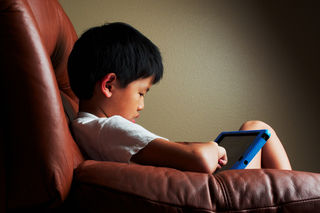Friends
The Right Dose of Screen Time for Kids
What research tells us about making screen time rules for your kids.
Posted October 22, 2016
Before I became a parent, I had the same self-righteous attitude about my future son that a lot of people have before becoming a parent: There would be absolutely no screen time in my house. I judged parents at restaurants for cramming an iPad in front of their 5-year-olds during dinner, and scoffed at my friends for buying a mini-van fully equipped with a TV and DVD player. In 2011, the American Academy of Pediatrics (AAP) recommended that children under the age of 2 should not watch any television, and slightly older kids should be limited to 2 hours of screen time per day. This sounds easy enough if you’re not a parent, but now that I am, the idea of keeping my son from screens altogether just sounds unrealistic; so unrealistic in fact that Friday, the AAP changed their policy. They now recommend that parents keep infants under 18 months of age away from screens as much as possible, unless it is to video chat with grandparents or other relatives.

The AAP’s change of heart likely reflects the reality that screens have become part of our everyday lives and we have to make decisions about when and how to regulate our kids’ screen time use. Although some researchers would disagree, a little bit of screen time is not all that bad, as long as you have the right expectations about what screens are and what they are not, and about what they can and can’t offer your kids. Here’s what research can tell us:
1. Screens are a means by which kids can learn if the content is educational. But, this is only true for older kids and there is little evidence children under the age of 2 can learn from screens at all, which is what prompted the AAP’s original no-screen-time-for-babies policy. In fact, there are doubts about whether infants and young children can even understand the content of what they are seeing on screens. So, it’s fine to let your kids watch a little bit of PBS Kids, as long as you’re not expecting it to teach your babies how to read.
2. Screens themselves are not actually bad for your kids. What I mean is, there is no evidence that the act of watching a TV or playing with an iPad makes kids dumber, hurts their vocabulary or reading skills, or makes them fail math. It’s what screen time is replacing that can be detrimental to learning, like if your child is watching TV instead of playing outside or doing his homework. So if screen time is replacing a potential fight with a sibling during a long car ride, it can be a great tool, but if it’s replacing time when your kids can be playing outside with their friends, it’s probably not so great. The bottom line is, active play is always better than using a screen, so if screen time is replacing playtime, maybe it’s time to put the iPad away.
3. Screens can distract kids if they are left on in the background. There’s research suggesting that background TV distracts kids from other activities, like playing with toys or talking to parents. It’s distracting nature also reduces the quality of children’s play. So if your kid isn’t specifically sitting down to watch Sesame Street, it’s best to just leave the TV off.
4. Screens cannot teach your kids more than you can. Although there is some research suggesting that kids can learn from screen time or educational television shows, there’s lots of research showing that kids learn much better by interacting with their parents, friends, and teachers, and they learn better from screens by watching it with you.
5. The content of children’s screen time matters. There is mounting evidence that engaging with media that contains violent content (including both TV and video games) does in fact increase aggressive behavior in children. With the countless number of educational shows and apps available for kids these days, there is no reason why they should be watching adult-directed programming, especially programming that contains violence.
With these ideas in mind, my own rule of thumb for allowable screen time has been to ask myself: What is screen time replacing? Does watching Dora for 20 minutes replace an agitated conversation with a half-awake, unengaged parent who can later function better by having that 20 minutes to herself? Does watching a DVD in the car on a long trip replace an hour and a half of crying? In these cases, I’d say go for it, and don’t feel guilty. But if your kids want to spend all their time with screens instead of playing outside, it might be time to make some rules. In fact, the AAP’s new recommendations involve creating a family plan for screen time, so that parents can teach children about appropriate screen time use.


